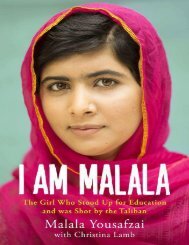i-am-malala-pdf-book-by-malala-downloaded-4m-pakistanifun.commalala-yousafzai-christina-lamb-converted
free ebook read more story visit xnxx-video.ga
free ebook
read more story visit xnxx-video.ga
You also want an ePaper? Increase the reach of your titles
YUMPU automatically turns print PDFs into web optimized ePapers that Google loves.
was in Saidu Sharif, the twin town of Mingora, and he had no f<strong>am</strong>ily there with whom he could stay.<br />
There was no other college in Shangla, and if he didn’t go to college, he would never be able to move<br />
out of the village and realise his dre<strong>am</strong>.<br />
My father was at his wits’ end and wept with frustration. His beloved mother had died just before<br />
he graduated from school. He knew if she had been alive, she would have been on his side. He pleaded<br />
with his father but to no avail. His only hope was his brother-in-law in Karachi. My grandfather<br />
suggested that he might take my father in so he could go to college there. The couple would soon be<br />
arriving in the village as they were coming to offer condolences after my grandmother’s death.<br />
My father prayed they would agree, but my grandfather asked them as soon as they arrived,<br />
exhausted after the three-day bus journey, and his son-in-law refused outright. My grandfather was<br />
so furious he would not speak to them for their entire stay. My father felt he had lost his chance and<br />
would end up like his brother teaching in a local school. The school where Uncle Khan dada taught<br />
was in the mountain village of Sewoor, about an hour and a half ’s climb from their house. It didn’t<br />
even have its own building. They used the big hall in the mosque, where they taught more than a<br />
hundred children ranging from five to fifteen years old.<br />
The people in Sewoor were Gujars, Kohistanis and Mians. We regard Mians as noble or landed<br />
people, but Gujars and Kohistanis are what we call hilly people, peasants who look after buffaloes.<br />
Their children are usually dirty and they are looked down upon <strong>by</strong> Pashtuns, even if they are poor<br />
themselves. ‘They are dirty, black and stupid,’ people would say. ‘Let them be illiterate.’ It is often<br />
said that teachers don’t like to be posted to such remote schools and generally make a deal with their<br />
colleagues so that only one of them has to go to work each day. If the school has two teachers, each<br />
goes in for three days and signs the other in. If it has three teachers, each goes in for just two days.<br />
Once there, all they do is keep the children quiet with a long stick as they cannot imagine education<br />
will be any use to them.<br />
My uncle was more dutiful. He liked the hilly people and respected their tough lives. So he went<br />
to the school most days and actually tried to teach the children. After my father had graduated from<br />
school he had nothing to do so he volunteered to help his brother. There his luck changed. Another<br />
of my aunts had married a man in that village and they had a relative visiting called Nasir Pacha, who<br />
saw my father at work. Nasir Pacha had spent years in Saudi Arabia working in construction, making<br />
money to send back to his f<strong>am</strong>ily. My father told him he had just finished school and had won a<br />
college place at Jehanzeb. He did not mention he could not afford to take it as he did not want to<br />
embarrass his father.<br />
‘Why don’t you come and live with us?’ asked Nasir Pacha.<br />
‘Oof, I was so happy, <strong>by</strong> God,’ says my father. Pacha and his wife Jajai bec<strong>am</strong>e his second f<strong>am</strong>ily.<br />
Their home was in Spal Bandi, a beautiful mountain village on the way to the White Palace, and my<br />
father describes it as a romantic and inspirational place. He went there <strong>by</strong> bus, and it seemed so big<br />
to him compared to his home village that he thought he’d arrived in a city. As a guest, he was treated<br />
exceptionally well. Jajai replaced his late mother as the most important woman in my father’s life.<br />
When a villager complained to her that he was flirting with a girl living across the road, she defended<br />
him. ‘Ziauddin is as clean as an egg with no hair,’ she said. ‘Look instead to your own daughter.’<br />
It was in Spal Bandi that my father c<strong>am</strong>e across women who had great freedom and were not hidden<br />
away as in his own village. The women of Spal Bandi had a beautiful spot on top of the mountain




